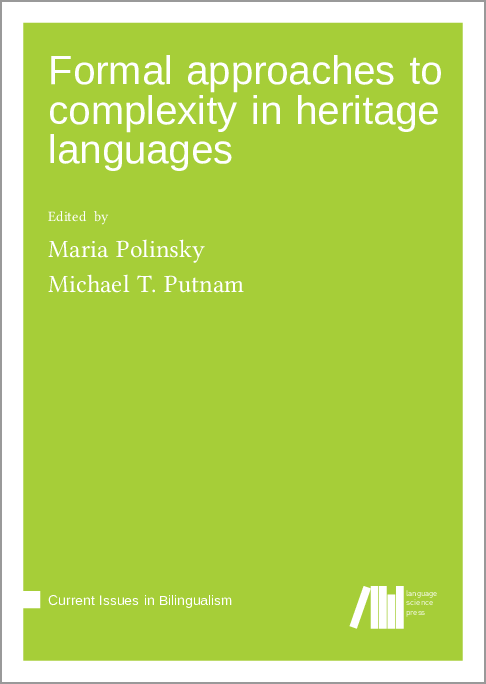We log anonymous usage statistics. Please read the privacy information for details.
Formal approaches to complexity in heritage language grammars
Synopsis
This collective volume breaks new ground in studies of linguistic complexity by addressing this phenomenon in heritage languages. It dismisses with the conception that heritage languages are less complex than their baseline or homeland counterparts and shows complexity trade-offs at various levels of linguistic representation. The authors consider defining properties of complexity as a phenomenon, diagnostics of complexity, and the ways complexity is modeled, measured, or operationalized in language sciences. The chapters showcase several bilingual dyads and offer new empirical data on heritage language production and use.
Chapters
-
Linguistic complexity in heritage languagesAn introduction
-
Expressing diminutive meaning in TwiThe role of complexity and language-specific preferences
-
How different types of complexity can account for difficult structures in bilingual and monolingual language acquisition
-
The complexity of word order change in a flexible systemOn stability and variation in heritage Russian word order
-
Expanding structures while reducing mappingsMorphosyntactic complexity in agglutinating heritage languages
-
A multi-generational analysis of heritage language complexity
-
Non-monotonic functional sequencesA new metric for complexity in heritage languages

Downloads
Published
July 24, 2024
LaTeX source on
GitHub
Cite as
Polinsky, Maria & Putnam, Michael T. (eds.). 2024. Formal approaches to complexity in heritage language grammars. (Current Issues in Bilingualism 3). Berlin: Language Science Press. DOI: 10.5281/zenodo.12073160
Copyright (c) 2023 Maria Polinsky, Michael T. Putnam; Felix Kpogo, Joe Salmons, Alexandra Elizabeth Kohut, Charles Chang, Esther Rinke, Cristina Flores, Jacopo Torregrossa, Oksana Laleko, Terje Lohndal, Ashvini Varatharaj, Gregory Scontras, Naomi Nagy, Roberta D'Alessandro, Silvia Terenghi
Details about the available publication format: PDF
PDF
ISBN-13 (15)
978-3-96110-478-9
doi
10.5281/zenodo.12073160
Details about the available publication format: Hardcover
Hardcover
ISMN-13 (25)
978-3-98554-107-2
Physical Dimensions
180mm x 245mm



